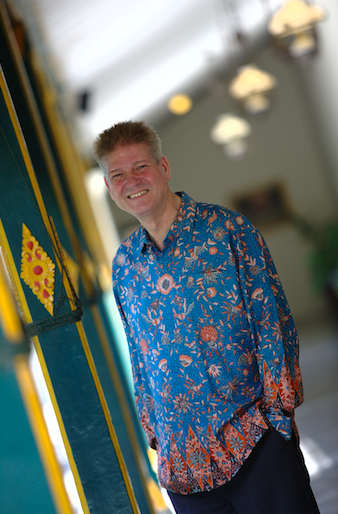The Central Bureau of Statistics shows Yogyakarta as the country’s top travel destination in recent years. The number of tourist arrivals to the province grew by more than 130 percent in 2016. Here’s how Ian Cameron, General Manager of Royal Ambarrukmo Yogyakarta, found himself ahead of the curve.
According to Global Business Guide Indonesia, despite a cooling economy in Indonesia and around the world, Southeast Asia’s biggest country continues to pull in a growing number of tourists from around the world. Simultaneously, locals themselves are travelling in the archipelago like never before.
As a result, the demand for hotel accommodations is poised to increase significantly in the coming years as more leisure travellers and business folks come to the country. Increased trade integration in ASEAN and more affordable airfares are a bonus for hotels and hospitality businesses in Indonesia. This should help the sector overcome challenges of oversupply in some areas, such as Bali.
But after tourists and business travellers have done what they need to in Jakarta and Bali, the next place they will inevitably focus on is Yogyakarta in Central Java. This is a bet that Ian Cameron, the General Manager at Royal Ambarrukmo Yogyakarta, is willing to make.
Royal Ambarrukmo is one of the few five-star hotels in the city, and Cameron has been overseeing the operation for nearly a year and a half. Prior to serving as the general manager for the premium venue in Yogyakarta, the Scotland native spent most of his life travelling the world in the hospitality business.
“I first came to Indonesia to work some 27 years ago. I spent three years in Bali then at a hotel in Legian. This was a time when Bali was very different from now. I have worked in Thailand, Egypt, Singapore, South Korea, last in the Philippines before returning to Bali for four years and then moving to Yogyakarta just over a year ago,” the expat recalled.
Having worked in hotels and served as general manager at a range of top-notch resorts in Bali such as Swiss-Belhotel International in Pecatu, Ramada Resort and Grand Aston in Nusa Dua and Centra Taum in Seminyak, it seems evident that Cameron is a bona fide lifer in Indonesia’s resort hierarchy. He recalls his first encounter with the hospitality business:
“When I was 12 years-old I took my first holiday job in a hotel, close to where I lived in Scotland, in the kitchen doing the washing up and then as a waiter. I enjoyed the dynamic of working with others at the hotel and also being a part of creating the magic that guests feel, or certainly should
I enjoyed the dynamic of working with others at the hotel and also being a part of creating the magic that guests feel, or certainly should feel, when they experience a hotel or restaurant.”
Having taken to the industry from a young age like a duck to water, Cameron attended hotel school in Edinburgh for four years and eventually set his sights on Asia.
“Even then I knew I wanted to work in the Far East, I didn’t know why particularly, other than the fact that better service was possible in hotels here,” explained Cameron. “I started then to write letters to hotels in Asia applying for positions. Email wasn’t around then so it was old fashioned mail by post, and it was nice to get back the responses – even though they were rejections due to lack of any overseas experience – on good quality hotel letterhead from places such as Hong Kong, Singapore and others, then considered very exotic places to travel to.”
According to the general manager, Yogyakarta’s hotel industry outlook is an encouraging one. He highlighted the city’s soon-to-open international airport, adding that it will potentially increase the market in new and exciting ways.
In April, President Joko “Jokowi” Widodo expressed his belief that Yogyakarta’s tourism sector holds great potential. The national strategy and Yogyakarta’s economic program aim to focus on developing tourism and the province’s creative industry. According to the Central Bureau of Statistics, Yogyakarta was the country’s top travel destination in 2016. The number of tourist arrivals to the province spiked by more than 130 percent during a one-year period.
In January of 2017, the tourism ministry predicted that by 2020, Indonesia’s tourism sector will become the biggest revenue contributor for the country at large.
With more than 47,000 local and foreign tourists arriving at the Gunung Kidul District in the Special Region of Yogyakarta (just one of the province’s several tourist attractions) for Easter weekend in April, the ministry’s prediction doesn’t seem too far-fetched.
The accelerated growth of tourism and business travel in Yogyakarta is plain to see in 2017, as a variety of starred hotels have recently cropped up to compete with Royal Ambarrukmo, including names like Meliá, Adonara Group and the 150-room Royal Kraton. However, as an early mover in the province’s budding tourism space, Cameron finds himself at the centre of a unique business intersection, one that is brimming with opportunity.
The general manager humbly added, “Indonesia is such a vast country with all sorts of different destinations and I do believe that Yogyakarta is a fantastic holiday destination in its own right.”




